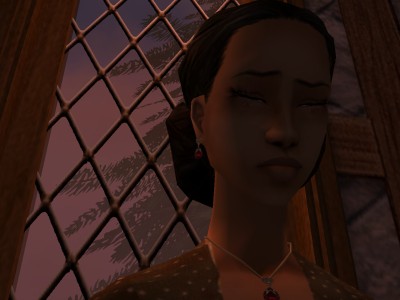
Gunnilda had a cook now and no longer needed to do more in the hour before supper than decide what they would be having and occasionally scold the woman for being wasteful.
She also had a nurse to care for little Alred and young Theobald, and Eadgard was old enough to spend the days with his father in the workshop. Gytha was allowed to go out and play in the long summer evenings, and Bedwig worked on his father’s farms under the direction of Osric. Colburga and Wynna went out with their friends, Gunnilda knew not where.
It meant that the hour before supper was very empty for her, and such emptiness was something that Gunnilda had never before experienced. She had always worked all day, ever since she was old enough to hold a dishcloth in one hand and a dish in the other. She had always had a small child in her arms or tugging on her skirts, ever since she was a girl of sixteen and had Bertie.

But she would soon have plenty to keep her busy, and soon have a small child in her arms again. She knew that now. Since her marriage – and even long before, while Alwy had still lived – every month was an anguished wait, followed by a relief that lasted for a short time until the waiting began again for the next month. But she thought she could stop waiting now.
It had been a long while since she had thought over her reasons for not wanting more children. She no longer had to think; her mind recoiled from the mere idea of having a baby. Her heart still bled from wounds upon wounds upon wounds that would not heal. But it was not her mind that had decided for her; it was not her heart. It was her body, and that belonged to Ethelmund.

Ethelmund would be pleased, and that was some consolation. Her sisters had had husbands who would storm and rage when they learned they would soon have another mouth to feed – not that they had ever learned to stay out of their wives’ beds. In her mind, when she thought of her sisters, she knew herself to be a fortunate woman.
Between Ethelmund’s farms, her farms, and the work he did for the noblemen, their family was quite well-to-do, and they could easily provide for another small mouth. But Ethelmund so loved children that he would have been delighted even if they had had to starve themselves to feed another.
At times it amazed her that the loss of five children had not taught him to be more guarded with his love. And yet the loss of four children seemed to have taught her nothing either. She had tried to be a kind and just stepmother to Ethelmund’s four children, and instead she had come to love them fiercely, as if they were her own. It was not her mind that had decided for her; it was her heart.

But her heart was aching with wounds upon wounds, and she thought that another blow would finish her. She knew that one could not die from grief alone, for she had tried. She dreaded more the living death that was the death of the heart: some shadowy, joyless existence that must from dusk to dusk be like these empty hours.
“There you are!” Ethelmund laughed.

Gunnilda opened her eyes. She must have been dozing; she had not heard him come in. If she could fall asleep thus at the end of a lazy day, it was only another sign that what she had feared was upon her at last.
“I didn’t even look in here the first time,” Ethelmund said and sat heavily beside her. “I saw the lamps were out.”
“I guess I didn’t need them since I wasn’t working on anything,” she mumbled, trying to reach down into that place where she could still find the strength to carry on a casual conversation.
“I don’t know that I like you sitting here in the dark,” he said tenderly.

“It wasn’t so dark when I came in.”
“The sun’s on its way down now. It makes you look a little sad.”
“Oh! I guess I’m just tired or something.”
“Hopefully it’s just ‘tired’ and not ‘something’,” he joked.
“Hopefully it’s not ‘something’,” she agreed.






Poor Gunnilda. She really isn't happy, is she? Her thoughts of "wounds upon wounds" is such a sad, scary way of thinking.
And poor Ethelmund doesn't seem to have a clue of just how depressed she is. How very sad.